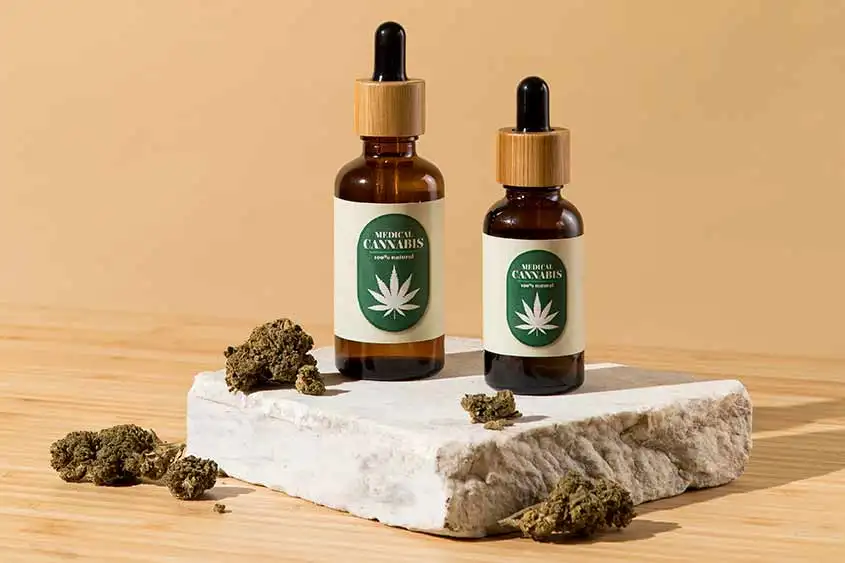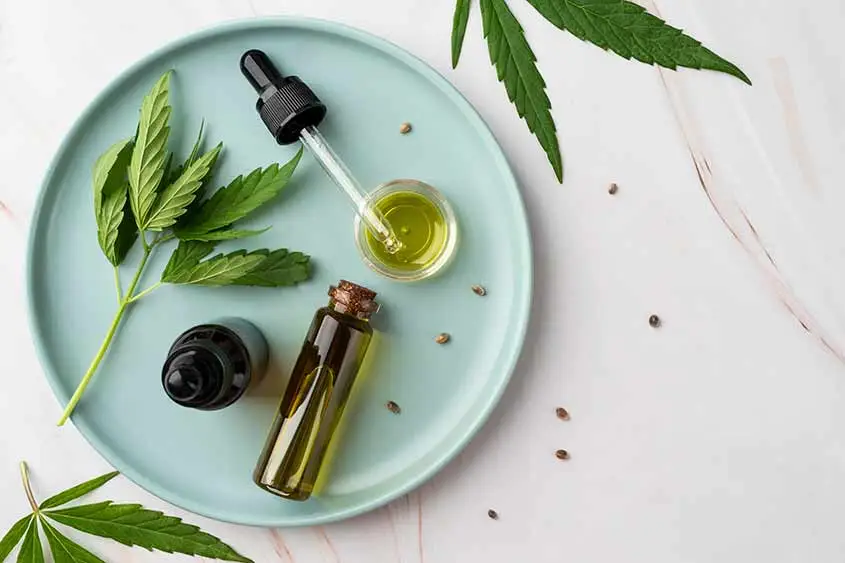CBD oil, an extract from the cannabis plant, has gained popularity for its potential therapeutic benefits. It is derived from Cannabis indica or Cannabis sativa, the same plants used to produce marijuana. CBD oil offers a range of uses that have piqued the interest of both researchers and consumers.
Believed to help treat pain, decrease anxiety, and stimulate appetite, CBD oil provides these benefits without the psychoactive effects associated with marijuana. This blog will look at its uses, health benefits, and potential risks.
What is CBD Oil?

Understanding CBD
CBD, short for cannabidiol, is one of over 100 naturally occurring cannabinoids found in the cannabis plant. Cannabinoids are chemical compounds that interact with the endocannabinoid system (ECS) in the body, which helps regulate various physiological processes such as mood, pain sensation, appetite, and immune response. CBD is extracted from the plant using CO2 extraction, which ensures a high-quality and pure product.
CBD vs. THC
While both CBD and THC are in the cannabis plant, they have distinctly different effects:
- THC (Tetrahydrocannabinol): This is the main psychoactive component in marijuana that produces the “high” sensation. THC binds directly to CB1 receptors in the brain, affecting mood, memory, and perception.
- CBD (Cannabidiol): Unlike THC, CBD does not produce a high. It interacts differently with the ECS, primarily influencing CB2 receptors in the immune system. This interaction can provide various health benefits without altering mental state or perception.
How is CBD Oil Made?
CBD oil production involves several steps to ensure purity and effectiveness:
- Cultivation: High-CBD strains of cannabis or hemp plants are cultivated using organic farming practices to avoid pesticides and contaminants.
- Harvesting: Once mature, the plants are harvested and dried.
- Extraction: CBD is extracted from the plant material using methods like CO2 extraction. This method uses pressurized carbon dioxide to pull CBD and other beneficial compounds from the plant, producing a clean, high-quality extract.
- Refinement: The raw extract undergoes further refinement to remove impurities and unwanted components, resulting in a concentrated CBD oil.
- Mixing: The refined CBD is then mixed with an inert carrier oil, such as coconut oil or hemp seed oil, to create the final product.
Forms of CBD Oil
CBD oil is available in various forms to suit different preferences and needs. Here are some options:
- Tinctures: Tinctures are liquid extracts that come in small bottles with droppers. You can place drops under your tongue for quick absorption into the bloodstream. Tinctures come in different concentrations, allowing for precise dosing.
- Capsules: Capsules are an easy way to consume CBD, offering pre-measured doses in pill form. They are convenient for those who prefer not to taste the oil and want a consistent dose each time.
- Gummies: Gummies are edible candies infused with CBD. They come in various flavors and are a discreet and tasty way to consume CBD. Gummies are popular among those who want a fun way to take their daily dose.
- Sprays: Sprays are liquid forms of CBD that you can spray under your tongue. They are similar to tinctures but offer a different method of delivery. Sprays can be convenient and quick to use, making them ideal for on-the-go consumption.
- Topicals: These are creams, balms, and lotions infused with CBD, applied directly to the skin. They are used to relieve inflammation and skin conditions.
- Vapes: You can inhale CBD vape oil using a vape pen or vaporizer. This method allows for rapid absorption into the bloodstream through the lungs. However, vaping may not be suitable for everyone, particularly those with respiratory conditions.
Health Benefits of CBD Oil

Research into CBD for therapeutic uses is ongoing, but many studies and anecdotal reports suggest several health benefits. Some of the health benefits include:
- Decreasing Inflammation and Pain
CBD oil has anti-inflammatory properties that may help reduce pain and inflammation. It is often used to manage chronic pain conditions such as arthritis and joint pain.
- Treating Seizures
CBD oil can help manage certain types of seizures. The FDA has approved a CBD-based medication, Epidiolex, for treating seizures associated with Dravet syndrome and Lennox-Gastaut syndrome, which are severe forms of epilepsy.
Mental Health Benefits
CBD oil can reportedly help with anxiety and depression. Some studies suggest it may help improve sleep disorders, PTSD, and migraines. It may also provide relief from cluster and other headaches.
Other Potential Benefits
CBD oil is also being explored for its potential benefits in treating a variety of other conditions, including:
- Nausea and vomiting
- Cancer-related symptoms
- Allergies or asthma
- Epilepsy and other seizure disorders
- Multiple sclerosis (MS)
- Lung conditions
- Parkinson’s disease
- Alzheimer’s disease
Despite these potential benefits, do note that CBD oil is not legal in all US states.
CBD and THC: Differences

Understanding THC
THC (Tetrahydrocannabinol) is the most well-known compound in marijuana due to its psychoactive properties. Here’s what you need to know about THC:
- Psychoactive Effects: THC is the primary component responsible for the “high” that people experience when they use marijuana. This high is due to THC’s ability to bind to CB1 receptors in the brain, affecting areas that influence pleasure, memory, thinking, coordination, and time perception.
- Medical Uses: Despite its psychoactive effects, THC has been found to offer several medical benefits. It can help reduce nausea and vomiting, especially in patients undergoing chemotherapy, improve appetite in patients with HIV/AIDS, and alleviate chronic pain and muscle spasticity.
- Legal Status: The legality of THC varies widely. In some places, it’s legal for medical or recreational use, while in others, it remains illegal.
Understanding CBD
CBD (Cannabidiol) is another prominent compound found in the cannabis plant, but it differs significantly from THC:
- Non-Psychoactive: Unlike THC, CBD does not produce a high. This is because it interacts differently with the endocannabinoid system, primarily influencing CB2 receptors, which are spread throughout the body and play a role in immune response and inflammation.
- Medical Benefits: CBD is believed to offer various health benefits without the mind-altering effects of THC. Research suggests it can help manage conditions like anxiety, chronic pain, inflammation, epilepsy, and even some neurodegenerative disorders. The non-psychoactive nature of CBD makes it an attractive option for those seeking relief without the euphoria associated with THC.
- Safety and Tolerance: CBD is generally well-tolerated, even at high doses, and does not cause the same dependence and withdrawal symptoms as THC.
CBD Oil Composition
- CBD Oil and THC Content: Most commercially available CBD oils are derived from hemp, a variety of cannabis that is low in THC. By law, hemp-derived CBD products must contain less than 0.3% THC to be legal in many jurisdictions. This trace amount of THC is not enough to produce any psychoactive effects.
- Full-Spectrum CBD Oil: This type of CBD oil contains a range of cannabinoids, including trace amounts of THC, as well as other beneficial compounds like terpenes and flavonoids. These compounds can produce the “entourage effect,” where they work together to enhance the therapeutic benefits.
- Broad-Spectrum CBD Oil: Similar to full-spectrum, but with all THC removed. This option still offers some of the entourage effects without any risk of THC exposure.
- CBD Isolate: This is the purest form of CBD, with all other plant compounds removed. It contains 99% pure CBD and no THC.
Legal Considerations
Legal Status of CBD and THC: The legal status of CBD and THC varies by region. In the United States, the 2018 Farm Bill legalized hemp-derived CBD products with less than 0.3% THC. However, THC remains illegal at the federal level, although some states have legalized it for medical or recreational use. Always check local laws to ensure compliance with regulations regarding CBD and THC products.
Risks and Side Effects of CBD Oil

Importance of Medical Consultation
As with most therapies, the use of CBD oil can have risks and side effects. It is crucial to consult with a healthcare provider before starting any new treatment to ensure it is appropriate for your specific health conditions and to avoid potential interactions with other medications.
Common Side Effects
Clinical research has identified several potential side effects of CBD oil. They can vary in severity and type from person to person. Some common side effects include:
- Anxiety: In some cases, CBD may cause an increase in anxiety levels, particularly in individuals who are sensitive to cannabinoids.
- Changes in Appetite: CBD can affect appetite, causing either an increase or decrease in hunger.
- Changes in Mood: Some users report mood swings or changes in their emotional state.
- Diarrhea: Gastrointestinal issues like diarrhea can occur, especially when taking higher doses of CBD.
- Dizziness: A feeling of lightheadedness or dizziness is sometimes reported.
- Drowsiness: CBD can cause drowsiness or fatigue, which may affect daily activities.
- Dry Mouth: A common side effect of CBD is dry mouth, also known as “cottonmouth.”
- Nausea: Some people experience nausea when using CBD oil.
- Vomiting: Although less common, vomiting can occur, particularly if your body is not used to CBD.
Potential Severe Side Effects
While many people tolerate CBD well, there are some potentially severe side effects to be aware of:
- Liver Damage: High doses of CBD may cause liver damage, especially in individuals with pre-existing liver conditions or those taking medications that affect liver function.
- Interactions with Other Drugs and Alcohol: CBD can interact with certain medications, including blood thinners and anti-seizure drugs, leading to potentially harmful effects. It can also interact with alcohol, enhancing its effects.
- Changes in Alertness: CBD can affect alertness and reaction times, making activities like driving or operating heavy machinery dangerous.
- Gastrointestinal Problems and Loss of Appetite: Prolonged use of CBD can lead to gastrointestinal issues and reduced appetite, which may result in weight loss.
- Mood Changes, Including Irritability and Irritation: Some users experience irritability and changes in mood, which can affect daily life and relationships.
- Reduced Fertility in Males: There is some evidence suggesting that CBD may reduce fertility in males by affecting sperm production and function.
CBD Oil Usage During Pregnancy
The FDA advises against using CBD during pregnancy or breastfeeding. Research indicates that marijuana use during pregnancy can negatively impact fetal brain development, and similar risks may apply to CBD. Therefore, it is best to avoid CBD oil during these periods to ensure the health and safety of the developing fetus or nursing infant.
While CBD oil offers potential therapeutic benefits, it is important to be aware of its risks and side effects. Consulting with a healthcare provider before starting CBD can help mitigate these risks and ensure safe and effective use. Always start with a low dose and monitor your body’s response, adjusting as necessary under medical guidance.
Conclusion
In conclusion, CBD oil, derived from the cannabis plant, has emerged as a popular natural remedy for a variety of health issues due to its potential therapeutic benefits. While it is often used to alleviate chronic pain, anxiety, and inflammation without the psychoactive effects associated with THC, it is essential to understand the differences between these two compounds. CBD offers many potential health advantages and comes in various forms to cater to individual preferences and needs. However, it is not without risks, and its usage requires careful consideration, especially given the legal complexities and the need for more comprehensive research.
Despite its promising benefits, users must be aware of the potential side effects and consult healthcare providers before starting CBD oil, particularly those with underlying health conditions or those taking other medications. Side effects can range from mild issues like dry mouth and dizziness to more severe risks like liver damage and interactions with other drugs. Additionally, CBD use is not recommended during pregnancy and breastfeeding due to potential risks to fetal and infant development. By approaching CBD oil with informed caution and professional guidance, individuals can better navigate its benefits and risks to make the most suitable choices for their health and well-being.
Consult a healthcare professional before using cannabis products; the advice provided is not a substitute for medical guidance.

